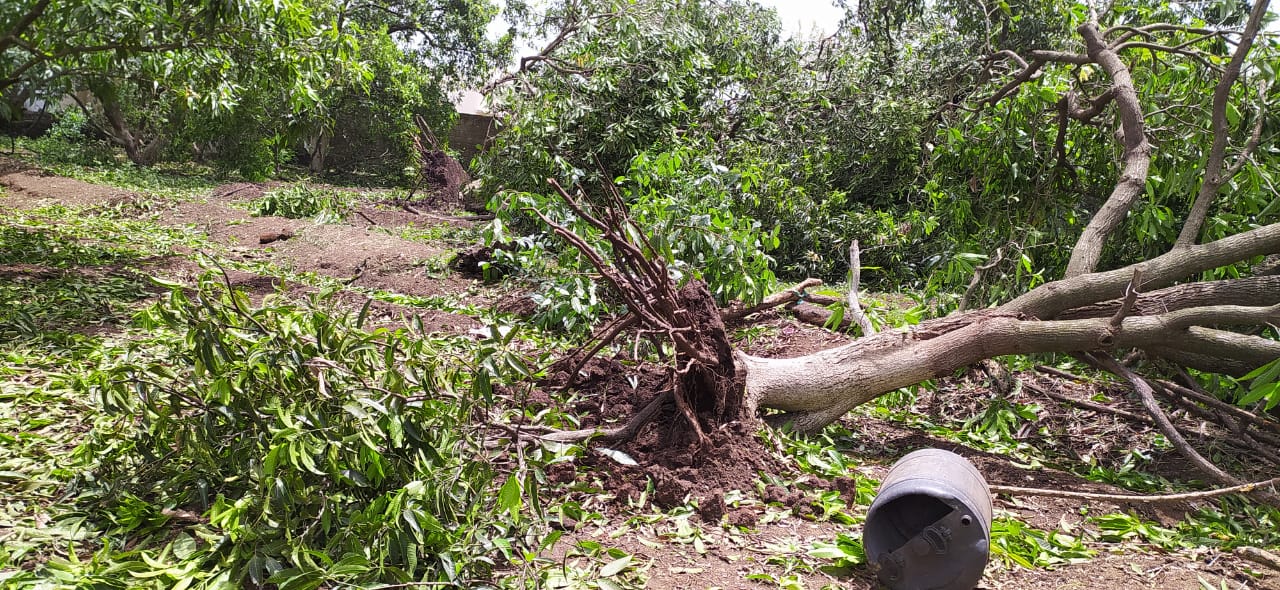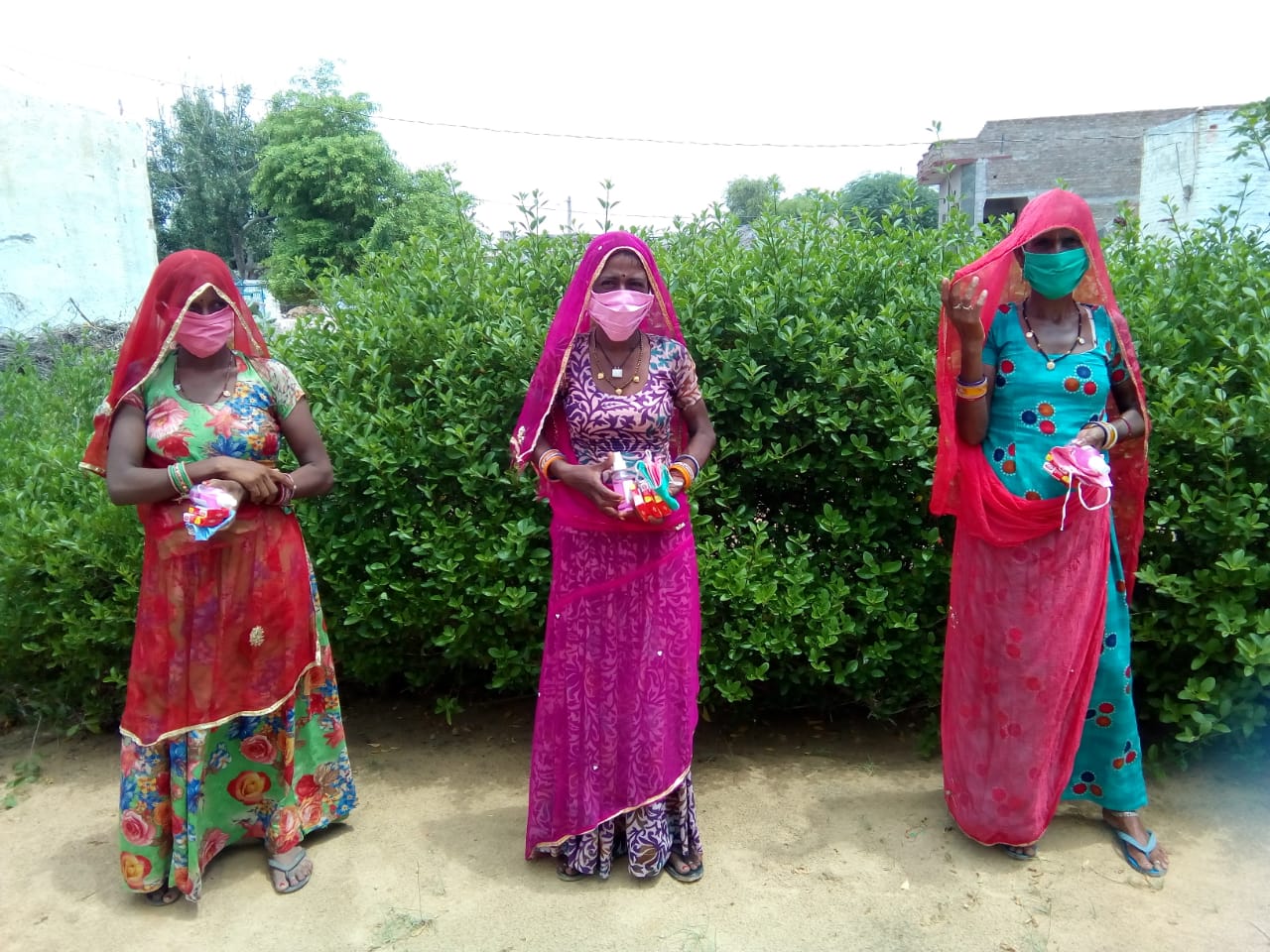Smallholder Farmers in India Battle Cyclone Tauktae and COVID-19
In this Q&A, TechnoServe’s India country director, Punit Gupta, shares how the farmers TechnoServe works with every day have been affected by two recent cyclones and a devastating surge of COVID-19 cases.
Farmers in India are Battling Cyclone Tauktae and COVID-19
While India grappled with a devastating surge of COVID-19 cases last month, Cyclone Tauktae slammed into its western coast, killing over 150 people and leaving thousands without homes. The following week, a less powerful but still damaging cyclone hit the country’s eastern coast. Hear from TechnoServe’s India country director, Punit Gupta, to learn how farmers are battling Cyclone Tauktae; how TechnoServe has adapted its work in response; and the outlook for India’s farmers in the face of COVID and climate change.
Q: What is the situation on the ground now? How are farmers battling the effects of Cyclone Tauktae, given the already grave situation with COVID-19?
A: Even before Cyclone Tauktae, which struck India’s west coast in mid-May, the situation on the ground was difficult. When cases of COVID-19 began to rise last year, the government implemented strict lockdowns and restrictions, which adversely affected the livelihoods of smallholder farmers across the country. Markets closed or implemented severe restrictions, making it difficult for farmers to sell their crops. Many farmers have yet to recover economically from the disruptions last year. Now, uncertainty about their livelihoods — coupled with concerns about health and access to medical care — have conspired to create an incredibly stressful environment.

TechnoServe operates in eight states across India, some of which were more affected by Cyclone Tauktae than others. For example, we work with mango farmers in Gujarat, located on India’s west coast, who were devastated by the storm. The cyclone reached their farms on May 18 with wind speeds of up to 180 kilometers per hour. The wind was accompanied by torrential rainfall for over 10 hours, creating panic among the region’s residents.
When the cyclone arrived, approximately 70% of the mango in the area was still immature and had not been harvested yet. After the storm, only 10% of the mango remained available for harvesting. This immediate loss for the farmers translates to 50% of their annual average income from mangoes.
Q: To what extent are extreme weather events like this becoming more common in your region?
A: Unfortunately, we are seeing more of these extreme weather events, and when they do occur, they are often more severe. Cyclone Tauktae was the strongest storm to hit the west coast of India in over 20 years. We’re also seeing changing weather patterns that are creating significant challenges for farmers across the country.
For example, in Bikaner, Rajasthan [a desert city in northern India], high temperatures and hot winds — coupled with delayed and scarce rainfall — are a matter of concern for guar farming communities. The farmers could not sow guar on time, which impacted their yields in 2020. Due to extreme weather conditions, farmers have had to leave the land fallow or cultivate moth, another legume with a comparatively shorter crop cycle than guar.
In Uttar Pradesh [a state in northern India], although extreme weather events such as cyclones are not that common, the region has been witnessing extreme temperatures during the winter and summer seasons. Mumbai has also experienced many floods due to excessive rainfall and cloudbursts. However, it is the first time in many years that it has experienced two cyclones two years in a row, with cyclone Nisarga in June 2020 and now Cyclone Tauktae in May 2021.
Subscribe to our newsletter to learn more about how TechnoServe is helping farmers around the world become more resilient to climate threats.
Q: How have the rising COVID cases in India affected TechnoServe’s work? What adaptations have you made to continue outreach to the people we work with?
A: The rising cases across India have led to strict lockdowns and limited mobility. At times, streets in the cities were empty, with the usually omnipresent traffic dwindling down to a trickle during lockdown periods. In many places, village life was affected by market closures, with a scarcity of household resources.
The pandemic also meant that some of our staff could no longer be in the field as often as they would like. To stay connected with our stakeholders, we reached out to them via digital modes of communication and conducted meetings through conference calls. We have also moved our operations (training, capacity building, monitoring, etc.) onto digital platforms. However, a few challenges persist, as many of our operational areas are hilly or have poor network receptivity.
One benefit of our model is that many of our staff are embedded in the communities we serve. These field extension officers and lead farmers have continued working with farmers during this unusual time. We regularly engage with our community-embedded staff to ensure they have the tools and resources they need to continue program activities successfully.”
— Punit Gupta, country director, TechnoServe India
To cope with the lack of nutritious groceries due to the closing down of markets, many rural families have been growing their own vegetables in kitchen gardens, using the training and seeds that we provided them with last year.
Our teams throughout the country have prepared COVID-19 contingency plans, which detail every activity that is being impacted by the pandemic and the most effective adaptation techniques or methods for continuing the activity with minimal delay. The project operations are adapted to regulations (lockdowns, limits to gatherings) and internal policies to reduce exposure to the virus.

Q: What evidence have you been seeing of this surge in your daily life? What has it been like for you to witness this distressing rise in infections?
A: During the first wave of COVID-19, there was an undercurrent of optimism due to the unexpectedly low mortality rate in India. The second wave of COVID-19, in contrast, has proven more fatal than the first. Most of us have a friend, colleague, or family member who has been severely affected or even died from the virus. Our staff has been exercising extreme caution for the last few months, remaining at home as much as possible while continuing to deliver impact to our clients.
When we do venture out, it is clear that many in India do not have the luxury of avoiding public spaces. Although government-mandated lockdowns have reduced car and foot traffic, crowds around shops and markets that provide essential services are not uncommon, especially in densely populated areas. Daily wage workers and small business owners often do not have substantial savings or alternative livelihood options, and thus have no choice but to continue work even during periods of rampant community transmission.

Q: What is TechnoServe doing to help the people we work with become more resilient in the face of climate change-related challenges? How can farmers best battle the effects of natural disasters like Cyclone Tauktae?
A: In Uttar Pradesh, TechnoServe is promoting changes at the farm level and the production level. For example, we help farmer producer companies collect harvests from farmers directly and store them in weather-resistant storage areas that mitigate the risk of damage due to rain.
In Andhra Pradesh [a coastal state in southeastern India], the climate change-induced drought can be partially mitigated by adopting mulching, conservation agriculture, and soil and water conservation measures. To prevent tea mosquito infestation, TechnoServe is also advising farmers to spray organic pesticide solutions like neem oil and coconut buttermilk during the flowering and fruit development stages.
The northwestern region of Rajasthan experiences very high temperatures during the summer, which has direct implications on the crops grown in the region. We help farmers identify shorter-duration crops and high-yield varieties that will survive even with variable rainfall.
Read our 2020 COVID Impact Report
Q: TechnoServe works with smallholder farmers throughout India. What do you see as the current and future impact of the COVID crisis on their livelihoods?
A: Although agriculture was the only sector in recent GDP estimates to record positive growth, the condition of smallholder farmers has been precarious. The pandemic has significantly limited their supplemental income from work as daily laborers. Supply chains have also been strained to the point of disruption. COVID-19 has had a considerable impact on smallholder farmers’ livelihoods, as they are still finding it difficult to market their produce due to low prices and restrictions on movement.
The COVID-19 first and second waves coincided with the primary harvest season. Crops like wheat, gram, lentil, mustard, etc., (including paddy in irrigated fields) are at a harvestable stage or are almost reaching maturity. This is also the time when the farm harvests typically reach the mandis (local markets) for assured procurement operations by designated government agencies.
The restrictions due to COVID-19 have made selling more difficult, and when farmers do sell, it is often at a reduced price. Meanwhile, the price for day-to-day necessities has increased. This combination might turn farmers toward borrowing, mortgaging, and unsustainable loans, which can hurt them in the long run.




